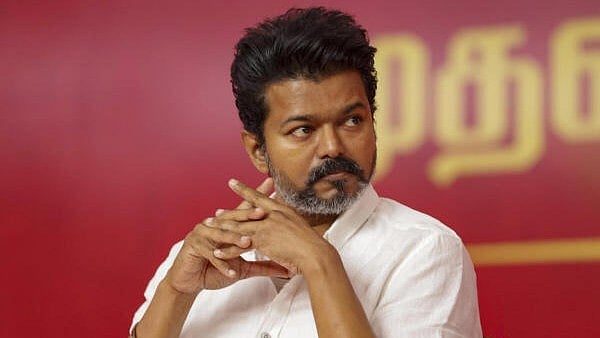
Actor and Tamilaga Vettri Kazhagam (TVK) chief Vijay.
Credit: PTI Photo
The connection between cinema and politics in Tamil Nadu is as old as the state’s post-independence identity. From Annadurai’s eloquence to MGR’s heroism, from Karunanidhi’s literary politics to Jayalalithaa’s commanding leadership, Tamil Nadu’s political theatre has long shared its stage with the silver screen.
Now, as actor Vijay formally enters the fray, one wonders – is this the right time, and is he the right man for the moment?
In pre-Independence India, politics was rooted in sacrifice and idealism. Gandhi, Patel, and Bose stood for moral courage and unity, not personal ambition. But as India matured, politics evolved – from idealism to identity. Tamil Nadu became the epicentre of this shift, blending regional pride, cinema, and populism into a powerful model of mass politics.
The Dravidian movement, born from Periyar’s Self-Respect philosophy, emphasised rationalism, linguistic pride, and social equality. Annadurai gave it mass appeal through his words and empathy, becoming the state’s first non-Congress Chief Minister.
Then came M G Ramachandran – the screen hero who became the saviour in real life. His welfare-driven governance and charisma made him immortal in public memory. Karunanidhi added intellectual depth and narrative strength to Dravidian politics, while Jayalalithaa redefined power with authority and grace in a male-dominated arena. Each of these leaders shared one gift – they understood the pulse of the people. They were not just stars or politicians; they embodied Tamil aspirations.
In that long lineage stands Joseph Vijay Chandrasekhar, “Thalapathy” to his millions of fans. Over three decades, he has transformed from a youthful entertainer into a cinematic crusader against corruption and injustice. His films have consistently echoed themes of accountability, youth empowerment, and reform – preparing audiences, perhaps unconsciously, for his political debut.
Vijay’s reach is unmatched, especially among the youth. His fan clubs, long engaged in welfare activities, have evolved into structured social units. His new party, Tamilaga Vettri Kazhagam (TVK), is seen as the natural culmination of that evolution.
Vijay’s timing is both promising and perilous. Tamil Nadu’s two Dravidian giants – DMK and AIADMK – are navigating leadership transitions and ideological fatigue. The once-fiery Dravidian narrative now feels procedural. The younger electorate, restless for change, craves a new vocabulary – one combining moral integrity with modern aspiration.
In that vacuum, Vijay could find his moment. His mass appeal, digital influence, and clean slate offer him a launchpad few enjoy. Yet politics demands far more than popularity – it requires structure, ideology, and staying power.
However, Vijay’s early political steps have not been flawless. The tragic Karur incident, where more than 40 people lost their lives during a crowd surge at one of his events, cast a shadow over his otherwise disciplined image. Many felt that Vijay’s muted response and delayed outreach reflected political inexperience. In a state as emotionally attuned as Tamil Nadu, such moments can shape long-term perceptions.
Equally, his public speeches have yet to make a strong ideological impact. His rhetoric, often generic, lacks the conviction or clarity that defined the Dravidian icons. Unless he articulates a vision grounded in Tamil socio-political realities, he risks appearing as a star searching for a cause – not a statesman shaping one.
Tamil Nadu’s electorate has matured. Charisma alone no longer guarantees success. MGR had welfare; Karunanidhi had ideology; Jayalalithaa had decisiveness. Vijay must now define his own political grammar—as the voice of the youth, the champion of clean governance, or the architect of a new social compact.
His entry has sparked curiosity and hope among first-time voters but also scepticism among seasoned observers. To sustain momentum, Vijay must expand beyond fan-based mobilisation, build credible leadership, and demonstrate ideological depth.
Vijay’s political debut marks a new chapter in Tamil Nadu’s ongoing experiment with cinema and democracy. His entry reflects both the people’s yearning for renewal and the enduring allure of star power. Whether he emerges as a serious reformer or fades as another celebrity experiment will depend on his ability to convert emotion into execution and applause into action.
If he can learn from missteps like Karur, anchor his politics in purpose, and speak not just to fans but to citizens, Vijay could yet script a remarkable transformation. But in Tamil Nadu’s exacting political culture, charisma without conviction is a short-lived story.
(The author is an entrepreneur and a freelance writer)
Disclaimer: The views expressed above are the author's own. They do not necessarily reflect the views of DH.